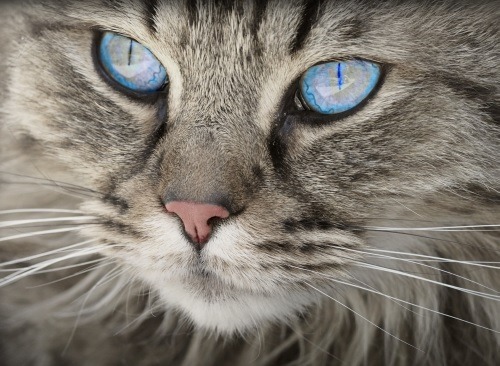Cats are experts at hiding illness. Not detecting your cat’s illness at the right time can lead to serious problems. Learn how to tell if your cat is sick here.
According to the American Veterinary Medical Association, cats have a collective average of 60.5 million trips to the vet each year.
A large number of these visits are routine check-ups or scheduled vaccinations. However, many people take their cats to the vet each day because of an illness.
Oftentimes, pet owners take their sick cat to the vet way later than they should. This isn’t due to negligence. Cats aren’t super expressive creatures, and it can sometimes be difficult to tell when your cat is actually sick and needs medical attention.
If you’re struggling to decide whether or not to take your cat to the vet, check out this guide to discover how to tell if your cat is sick.
Unexplained Litter Box Issues
If your cat has always been good about using her litter box and then all of a sudden starts making a mess, there’s a good chance that she’s sick.
Health issues that can cause litter box problems include urinary tract infections, kidney diseases, and bladder stones. However, before you jump to this conclusion, you want to make sure that your cat’s litter box is clean.
Your cat doesn’t like using a dirty litter box anymore than you like using a dirty toilet, so make sure you’re keeping up with cleaning it. You can check out Kitty Reporter to discover some low-maintenance litter boxes.
Also, if your cat appears to be struggling to urinate or defecate, you should take her to the vet immediately. This could be a sign that there’s a blockage somewhere, which could be fatal if left untreated.
Unexplained Weight Gain or Weight Loss
Unless you’ve had your cat on a special diet to lose or gain weight for medical reasons, they really shouldn’t have any noticeable weight changes.
Due to their small size, a cat losing or gaining a pound is like a human losing or gaining 15 pounds. In other words, it’s a drastic shift. In older cats, some weight loss is normal due to a loss in muscle mass.
However, sudden, unexplained weight loss may be a sign of a serious health issue such as cancer.
Also, if your cat is gaining weight at a steady weight due to overeating, this is still an issue. Obesity is dangerous for cats the same way it is for humans. It can lead to heart disease, diabetes, and other health issues.
If your cat is having weight issues, you should schedule an appointment with your vet as soon as possible.
Blood in Urine, Stool, or Vomit
If your cat has blood in her urine, stool, or vomit, this is another cause for concern.
Oftentimes, blood in the urine indicates a urinary tract disorder, particularly if it’s accompanied by straining while urinating or increased trips to the litter box.
Blood in your cat’s stool could be an indication of a variety of illnesses. Some of these are serious, like parasitic infections, and some are relatively minor.
Blood in vomit is almost always a sign of a serious issue. Also, if you notice what looks like coffee grounds in your cat’s vomit, this is actually partially digested blood. If you notice vomit in your cat’s blood, you should take her to the vet immediately.
Changes in Appetite
If you notice that your cat is refusing to eat or drink, then that typically means they’re in pain or feeling poorly. It can also indicate that they’re suffering from a disease.
If your cat is drinking a lot more water and urinating more frequently, then it could point to an issue such as kidney disease, diabetes, or hyperthyroidism.
No matter what, you should get your cat to the vet if you notice a change in appetite or thirst levels.
Constipation or Diarrhea
Untreated diarrhea can result in dehydration. This is because when your cat has diarrhea, too much water is expelled with their stool.
While dehydration may not seem like that big of a deal, it can be fatal if left untreated.
You can usually tell if your cat is constipated if they have hard, small, and infrequent stools. Typically, a cat defecates once or twice per day, so if they’re doing so less, it’s a cause for concern.
Oftentimes, constipation is caused by hairballs, and this can lead to weight loss and anorexia. While the occasional hard or watery stool is nothing to freak out about, if it’s persistent, you’ll want to see your vet.
Repeated Vomiting
Most cats vomit up hairballs from time to time.
However, anything more than the rare occasion warrants a trip to the vet. If your cat is vomiting, it could be due to a number of different issues.
They could be suffering from an infection, urinary tract disease, or some other health issue. Either way, you should get them to the vet ASAP. If your cat is vomiting blood, then you should head to the vet immediately.
Mobility Issues
If you notice that your cat is experiencing mobility issues, such as limping or stiffness, then this could indicate a serious health issue.
In older cats, this often a sign of arthritis. It could also be that they’ve injured a part of their body. Either way, you should see your vet about this issue.
Personality Changes
Personality and behavioral changes are normal when they happen over time, especially as your cat ages.
However, if your normally friendly cat is acting aggressive, or if your confident cat is suddenly very timid, then there’s likely an underlying issue that only your vet will be able to help you discover.
One common behavioral change is increased vocalization. If your quiet cat is suddenly making a lot of noise, it could indicate that they’re in pain or sick.
Additionally, if you notice your cat grooming itself a lot more than normal, it could mean they’re in pain or are experiencing a skin issue.
How to Tell If Your Cat Is Sick: Now You Know
Now that you know how to tell if your cat is sick, you should have a better idea of whether or not you need to take them to the vet. Hopefully, your cat will be back to its healthy self in no time.
Be sure to check back in with our blog for more pet-related tips and tricks.

